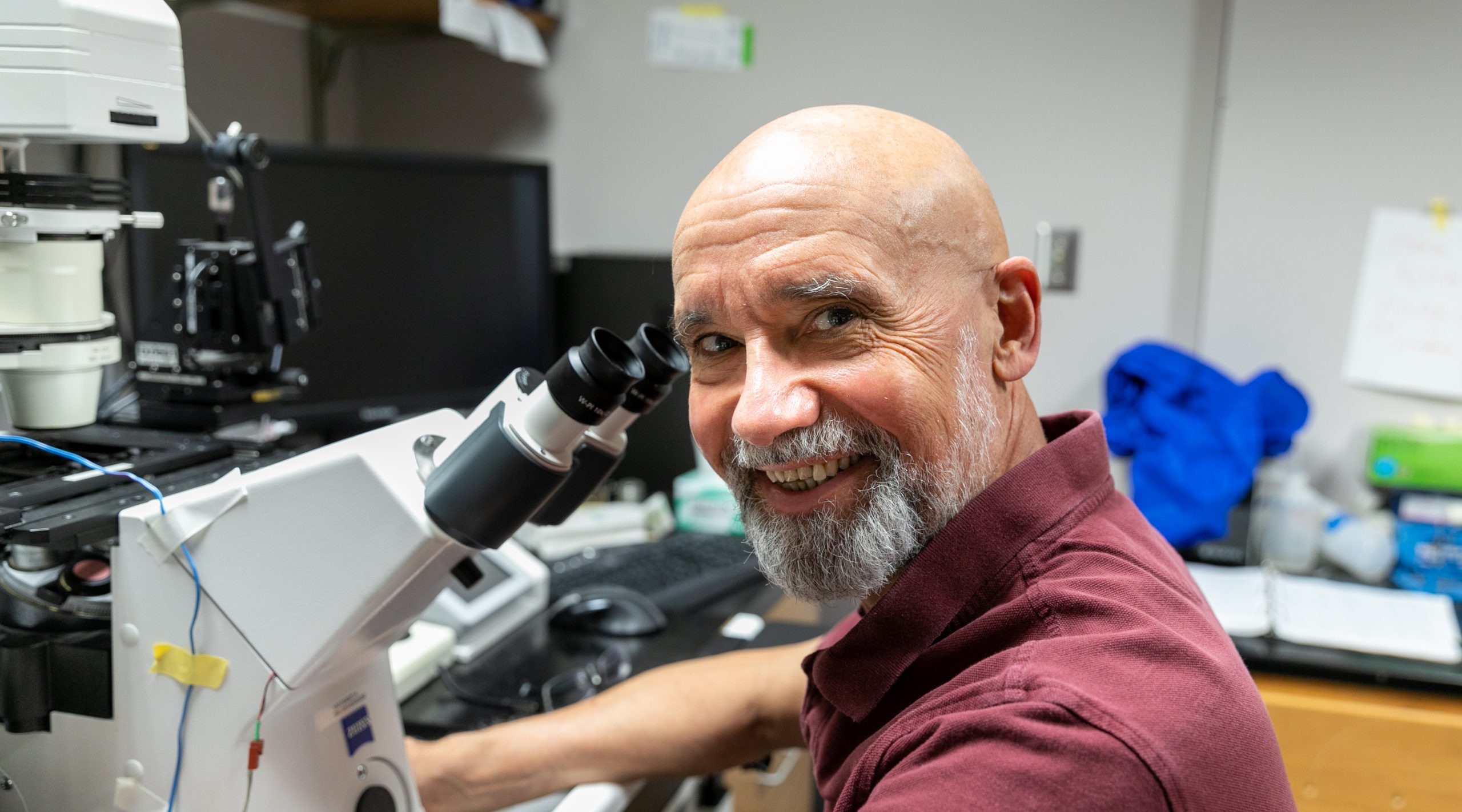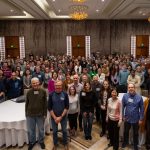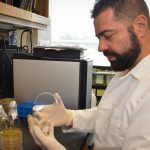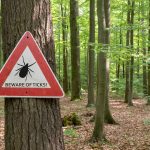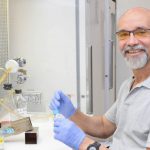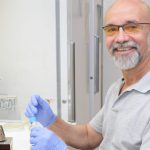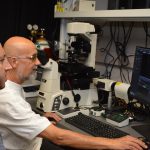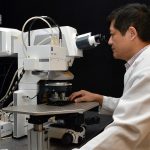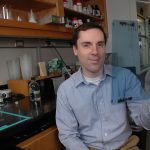Gary J. Gorbsky, Ph.D.
Professor and Program Chair
Cell Cycle & Cancer Biology Research Program
W.H. and Betty Phelps Chair in Developmental Biology
Adjunct Professor, Department of Cell Biology, University of Oklahoma Health Sciences Center
My 101
Cells are the basic building blocks of all plants and animals. Though too small to see by eye, cells are complex machines that have the amazing ability to make exact copies of themselves. This process is called cell division. Each of us started out as one cell. As adults we have about 50 quadrillion cells (5 followed by 16 zeros). Even as adults we need many new cells each day to replace those that die. We each make 7 million cells per second, which is about 10 billion cells each day.
My laboratory studies the awesome process of how cells divide. Each human cell contains 46 packets of DNA, the genetic material. These DNA packets are called chromosomes, and each chromosome is different. Every time a cell divides, the chromosomes are duplicated and then carefully distributed so that each of the two new cells that are formed gets a complete and accurate set of all the chromosomes. Usually cell division is extremely precise, but sometimes defects occur, resulting in newly formed cells receiving an incorrect set of chromosomes. Most human cancer cells have an abnormal set of chromosomes. This chromosome imbalance can contribute cancer cells growing out of control and invading normal tissues. Defects during cell division are also important triggers of infertility and birth defects. Researchers in my laboratory are trying to understand how the cellular machinery that distributes the chromosomes to the dividing cells is regulated. We seek to understand how cell division occurs flawlessly in most cases, but also how it sometimes goes wrong, leading to abnormal cell divisions that can contribute to cancer, infertility, and birth defects.
Research
Chromosome instability, the mis-segregation of chromosomes during meiosis and mitosis, is a major cause of congenital birth defects and an important contributing element in cancer malignancy. We have been characterizing the components of the cellular machinery that regulates the timing of chromosome segregation to ensure the genetic material is equally distributed to the newly formed cells during division. Our laboratory uses molecular biology and advanced imaging of living cells by microscopy to study the mechanisms of chromosome movement.
Currently, we are addressing the mechanochemistry of the motors that move chromosomes in mitosis and how these mechanical forces act to modulate kinase and phosphatase activities at the kinetochores of mitotic chromosomes. We have identified functions for several of the biochemical components of kinetochores including the Ndc80 protein complex, the Aurora B kinase, and the Spindle and Kinetochore Associated (SKA) complex. We recently discovered a novel inducer of chromosome instability called “cohesion fatigue.”
In a new project we are working to understand how microplastics affect the physiology of cellular functions such as gene expression, cell division, and cell motility. This work will provide insight into the potential consequences of human exposure to microplastics in the environment.
For more details visit the Gorbsky lab website: https://gorbsky.omrf.org/
Brief CV
Education
B.S., College of William and Mary, Williamsburg VA, 1976
M.S., Princeton University, Princeton NJ, 1978
Ph.D., Princeton University, Princeton NJ, 1982
Honors, Awards and Service
B.S with Highest Honors, College of William and Mary, 1976
Phi Beta Kappa, Alpha Chapter, 1976
Omicron Delta Kappa Leadership Society, 1976
Phi Eta Sigma Fellowship Award, 1976
Dunlop Prize from Princeton University, 1976
National Science Foundation Predoctoral Fellowship, 1976-1979
Chair, Publications Committee, FASEB, 2000
Chair, Nuclear Dynamics and Transport Study Section, NIH, 2004-2007
W.H. and Betty Phelps Chair in Developmental Biology, OMRF, 2005-present
Gaylord Prize for Scientific Achievement, OMRF, 2006
Distinguished Service Award, Israel Cancer Research Fund, 2013
Elected Treasurer & Executive Committee Member, Am. Soc. for Cell Biology, 2014, 2017
Whitman Research Fellowship, Marine Biological Laboratory, 2015, 2017
Distinguished Service Award, American Society for Cell Biology, 2020
Professional Associations
American Society for Cell Biology
American Association for Cancer Research
The MBL Society
American Association for the Advancement of Science
Joined OMRF scientific staff in 2003
Publications
Recent Publications
Narozna M, Latham MC, Gorbsky GJ. Origin of chromosome 12 trisomy surge in human induced pluripotent stem cells. J Cell Biol 224, 2025 November, PMID: 40801878
Narozna M, Latham MC, Gorbsky GJ. Origin of Chromosome 12 Trisomy Surge in Human Induced Pluripotent Stem Cells (iPSCs). bioRxiv, 2024 December, PMID: 39677655, PMCID: PMC11642788
Meyer RE, Sartin A, Gish M, Harsha J, Wilkie E, Haworth D, LaVictoire R, Alberola I, Chuong HH, Gorbsky GJ, Dawson DS. Polyploid yeast are dependent on elevated levels of Mps1 for successful chromosome segregation. bioRxiv, 2023 January, PMID: 36712123, PMCID: PMC9882063
Selected Publications
Tipton AR, Wren JD, Daum JR, Siefert JC, Gorbsky GJ. GTSE1 regulates spindle microtubule dynamics to control Aurora B kinase and Kif4A chromokinesin on chromosome arms. J Cell Biol. 2017 Oct 2;216(10):3117-3132. Epub 2017 Aug 18. PMID: 28821562 PMCID: PMC5626529
Potapova T, Gorbsky GJ. The Consequences of Chromosome Segregation Errors in Mitosis and Meiosis. Biology (Basel). 2017 Feb 8;6(1). pii: E12. Review. PMID: 28208750 PMCID: PMC5372005
Sivakumar S, Janczyk PŁ, Qu Q, Brautigam CA, Stukenberg PT, Yu H, Gorbsky GJ. The human SKA complex drives the metaphase-anaphase cell cycle transition by recruiting protein phosphatase 1 to kinetochores. Elife. 2016 Mar 16;5. pii: e12902. PMID: 26981768 PMCID: PMC4821802
Sivakumar S, Gorbsky GJ. Spatiotemporal regulation of the anaphase-promoting complex in mitosis. Nat Rev Mol Cell Biol 2015. EPub PMID: 25604195 PMCID: PMC4386896
Gorbsky GJ. The spindle checkpoint and chromosome segregation in meiosis. FEBS J Jul; 282(13):2471-87, 2015. EPub PMID: 25470754 PMCID: PMC4454629
Sivakumar S, Daum JR, Gorbsky GJ. Live-Cell Fluorescence Imaging for Phenotypic Analysis of Mitosis. Methods Mol Biol 1170:549-562, 2014. PMID: 24906336 PMCID: PMC4435798
Contact
Cell Cycle and Cancer Biology Research Program, MS 48
Oklahoma Medical Research Foundation
825 N.E. 13th Street
Oklahoma City, OK 73104
Phone: (405) 271-8168
Fax: (405) 271-7312
gary-gorbsky@omrf.org
https://gorbsky.omrf.org/
For media inquiries, please contact OMRF’s Office of Public Affairs at news@omrf.org.
Lab Staff
Magdalena Donczew, Ph.D.
Associate Staff Scientist
Courtney Sansam, Ph.D.
Associate Staff Scientist
Maria Narozna, Ph.D.
Postdoctoral Scientist
John Daum
Senior Manager of Laboratory
Duane Goins
Research Technician III
Jase Daugherty
Administrative Assistant III
Denna Mills
Administrative Assistant III
Cheryl "Cheri" Rutledge
Administrative Assistant III
News from the Gorbsky lab
Gary J. Gorbsky, Ph.D., a scientist at the Oklahoma Medical Research Foundation, has been selected to chair a grant selection committee for the National Institutes of Health in Bethesda, Md. The National Institutes of Health is the largest supporter of academic and non-profit research in the U.S., awarding approximately $23 billion in research grants annually. […]
At its annual honors and awards banquet Tuesday night at the Governor’s Mansion, the Oklahoma Medical Research Foundation awarded the Edward L. and Thelma Gaylord Prize for Scientific Achievement to Gary Gorbsky, Ph.D. Also that evening, Robert J. Barstead, Ph.D., was installed as the G.T. Blankenship Chair in Alzheimer’s and Aging Research. The event was […]
An Oklahoma Medical Research Foundation scientist has identified novel functions for an enzyme that may play an important role in causing cancers to become malignant and resistant to drug treatment. The discovery could have clinical relevance for the treatment of cancer. OMRF scientist Gary J. Gorbsky, Ph.D., has detailed his research in the journal Current […]
At its annual honors and awards banquet this evening, the Oklahoma Medical Research Foundation will name a pair of scientists as endowed chairs and add two new members to its board of directors. Xiao-Hong Sun, Ph.D., will be installed as the Eli Lilly Distinguished Chair in Biomedical Research, while Gary Gorbsky, Ph.D., will become the […]
The Oklahoma Medical Research Foundation announced today that Gary Gorbsky, Ph.D., has joined OMRF as head of the molecular and cell biology research program. With this addition, OMRF now counts forty-five principal scientists, its highest tally ever. Gorbsky comes to OMRF from the University of Oklahoma Health Sciences Center, where he was a professor and […]
